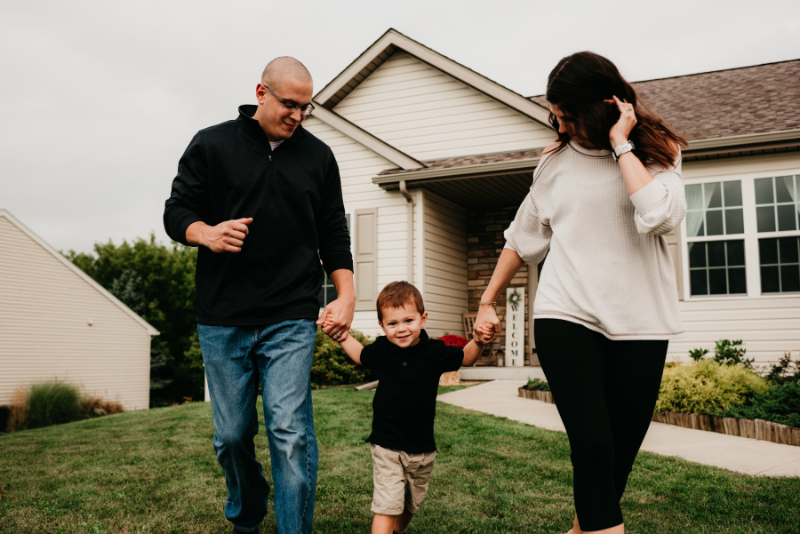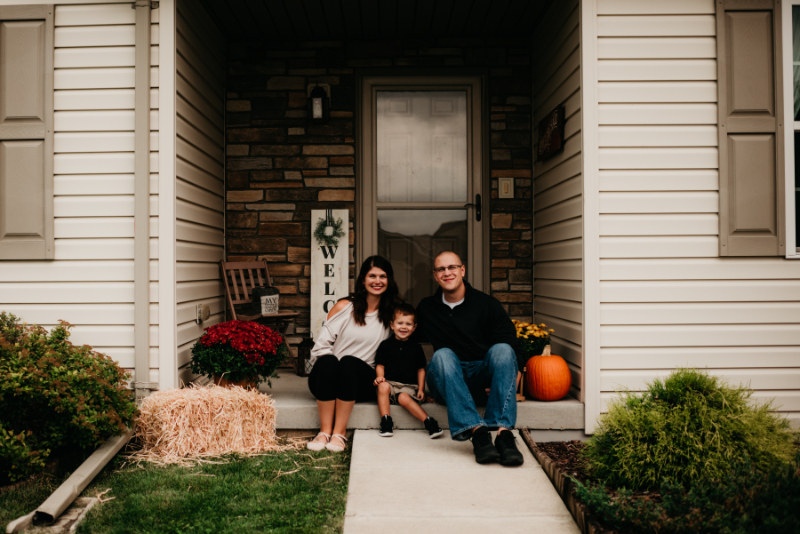Fatherhood and OCD: Balancing the Responsibilities of Parenting and Mental Health
July 1, 2025
When I became a parent, I was hit with a wave of emotions I didn’t expect. Joy, yes—but also fear, overwhelm, and a sense of deep responsibility. As someone who’s lived with OCD and specializes in treating it, I knew the mental load of parenting and mental health could be intense. But seeing it up close, especially in fathers, is something we don’t talk about enough.
Let’s change that.
Hey there, I’m Jenna. An LPC, a mom, and someone who knows firsthand how overwhelming it can be to balance parenting and mental health, especially when OCD is in the mix. That’s exactly why I’ve created straightforward, no-fluff tools (like my recovery course, podcast, and practical resources) to support you through the messy, real-life parts of this journey. Whether you’re in the thick of it or just starting to notice the signs, this is for you.

The Silent Struggle: Why Many Dads Don’t Talk About It
For many dads, opening up about their mental health (especially OCD) feels almost impossible. There’s this quiet pressure to “man up,” stay strong, and not let anything shake the foundation. I see it all the time in my work: dads suffering silently, thinking they have to hold it all together for everyone else.
But here’s the truth. Parenting and mental health are deeply connected, and ignoring one for the sake of the other only makes things harder.
When OCD shows up during fatherhood, it often targets the very things that matter most—your kids, your partner, your role as a protector. And because of how taboo some of these intrusive thoughts can be, it’s no wonder many fathers shut down instead of speaking up.
Listen to my podcast episode, “Dads Struggle, Too: Postpartum OCD in Fathers/Partners,” to hear real stories and expert insight on how OCD can show up after baby arrives. It’s not just moms, dads struggle too. Tune in here.
Real Talk: Common OCD Themes and Unique Pressures Dads Face in Fatherhood
Fatherhood and OCD can be a complicated mix. I’ve worked with dads who have intrusive thoughts about harming their kids, others who worry they’ll somehow drop the ball and ruin their children’s lives. The guilt and shame can be enormous. And when you layer on the daily stress of parenting (diapers, tantrums, work-life balance) it’s easy to feel like you’re drowning.
Common OCD themes in dads include:
- Fear of being a “bad parent”
- Obsessions about cleanliness or safety
- Intrusive harm thoughts involving their children
- Religious or moral obsessions tied to their parenting choices
What makes this even harder is that the world doesn’t always offer dads the same space to talk about these things. The focus is often on moms (and yes, maternal mental health matters deeply), but dads can be left feeling overlooked or forgotten. That’s not okay.
How OCD Interferes with Showing Up Fully as a Parent
Let’s talk about what this actually looks like on a day-to-day basis. OCD can turn even the simplest parenting moments into high-stakes challenges.
You want to change your baby’s diaper, but your brain screams, “What if they fall off the change table?” You want to give your child a bath, but you’re overwhelmed by fears of contamination or doing something wrong. You spend hours ruminating over whether you made a mistake, instead of being present with your family.
This isn’t about not loving your kids, it’s about OCD hijacking the moments that matter most. And it’s exhausting.
Mental health for parents isn’t a luxury. It’s essential. If your brain is constantly throwing out fear-based alarms, you can’t show up the way you want to. And that doesn’t make you a bad parent. It just means you need support (which, by the way, is a strength, not a weakness).

ERP in Action: What Treatment Can Look Like for Dads
So what do you do when OCD starts running the show? The gold standard treatment is Exposure and Response Prevention (ERP). It’s what I use with my clients and what helped me get my own life back.
ERP helps you face the things you fear (like bathing your child or being alone with them) without giving in to compulsions. It sounds scary, but I promise, it’s powerful. ERP teaches your brain that you can handle the discomfort without needing to “solve” the thought or seek reassurance.
For dads, ERP might look like:
- Changing diapers without ritualistic checking
- Letting intrusive thoughts pass without analyzing them
- Spending alone time with your child without calling your partner for constant reassurance
You don’t need to white-knuckle your way through fatherhood. With the right tools, you can actually enjoy parenting again. Yes, even with OCD.
Practical Ways to Find Balance as a Dad with OCD
Balancing parenting and mental health isn’t about doing everything perfectly, it’s about doing what you can, when you can. And giving yourself permission to take up space in the conversation.
Here are a few things that help the dads I work with:
- Create structure. OCD thrives on chaos. A loose routine can offer predictability and reduce stress.
- Set realistic expectations. You don’t have to be the perfect dad. You just have to be present (and imperfectly consistent).
- Know your triggers. Awareness is key. If you know what sets your OCD off, you can work on it intentionally, instead of reacting out of panic.
- Communicate with your partner. Let them in. They can’t support you if they don’t know what’s going on.
- Find extra help when you need it. You don’t have to do this alone. My self-paced masterclass and online course are here to guide you through ERP, parenting triggers, and more—so you can keep showing up with confidence and clarity.
It’s okay to ask for help. It’s okay to need space. And it’s more than okay to take care of your mental health for your sake—not just your kids’.
What to Do When You’re Triggered Around Your Kids
One of the hardest parts of fatherhood and OCD is when your child becomes the trigger. It can feel like the thing you love most is also the thing your brain tells you to fear. That’s a brutal paradox, but you can face it.
First, know this: just because you’re triggered doesn’t mean you’re dangerous. It means your OCD is loud right now. Try not to respond with avoidance or reassurance-seeking. Instead, sit with the discomfort. Remind yourself that thoughts are not facts. And take one step toward what matters, your child, your values, your role as a dad.
If your OCD tells you, “You shouldn’t be near your child,” ERP says, “Actually, let’s spend time with them and prove that fear wrong.” Bit by bit, that’s how healing happens.
For a deeper dive into how to handle parenting triggers, check out my blog post, “OCD and Parenting: When Your Child Becomes a Trigger.” It’s full of practical steps to help you reclaim peace and presence in your parenting. Read it here.

You Deserve to Be Well, Too
Fatherhood doesn’t mean losing yourself. Your needs, your struggles, and your growth matter just as much as anyone else’s in your family. And if you’re navigating parenting and mental health challenges right now, please know, you’re not failing. You’re showing up, and that’s incredibly brave.
Whether you’re deep in the trenches of OCD or just starting to notice the mental load piling up, there is hope. There’s treatment. And there’s a version of fatherhood that feels lighter, more connected, and less ruled by fear.
You don’t have to keep this all inside. Start the conversation. Get support. And take one small step today toward showing up fully—as a parent, and as a whole, worthy human being.
And if you’re ready for something more structured, my OCD and Anxiety Recovery Blueprint lays out exactly what I teach parents navigating these same struggles. You can start today, at your own pace.
Need a reminder that you’re not alone in this? My Break Free merch is all about turning daily moments into powerful ones. Whether it’s an affirmation card, a calming scent, or a sweatshirt that reminds you of your strength—you can find what speaks to you right here.
If podcasts are your thing, All The Hard Things is where I share real stories and strategies about recovery, parenting, and mental health. And don’t forget to grab my free lock screens—perfect for those moments when you need a steadying reminder right in your pocket.
most popular episodes
Love my podcast?
Episode 112: Postpartum OCD and False Memory OCD
Imagine how in depth I can go in an online course. Instantly downloadable and game-changing. Take the next step towards an amazing life.